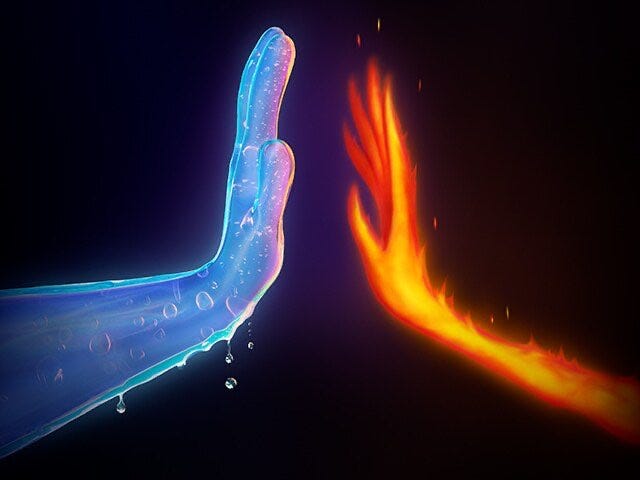Pixar’s real trick has never been talking toys or talking fish—it’s talking truth. Sure, it’s dressed in color and cloaked in fantasy. But under the hood of playfulness is something older. Heavier. They make you sit with your ghosts. The ache of being left behind (Toy Story). The weight of love and loss (Up). The quiet rules of who gets to belong and who doesn’t (Elemental). Pixar’s strength isn’t spectacle. It’s excavation. Gentle, deliberate, and unexpectedly personal. Sometimes the hole it leaves behind is shaped just like you.
The stories don’t just make you feel something. They make you notice what you’re feeling: grief, nostalgia, guilt, wonder, longing. They don’t explain emotions; they explore them. A fish searching for his son (Finding Nemo). A bug trying to preserve his family’s dignity (A Bug’s Life). Two elements falling in love despite expectations and fear (Elemental). And somehow, it still feels like they’re telling your story too.
One of Pixar’s quiet consistencies is verisimilitude. It doesn’t matter if they’re telling a story about a shadowy corporation that powers cities with harvested children’s screams (Monsters, Inc.), anthropomorphic cars living in a forgotten town (Cars), or a boy who crosses dimensions to meet his long-dead grandfather (Coco), the worlds they build are always believable, even if they’re fantastical.
Elemental is no different. Element City hums along like a well-oiled machine, alive with detail and logic, even as it operates under impossible physics. The city mirrors real-world cultural enclaves—Firetown evokes Little Italy or Chinatown, while The Wetro nods to Atlanta’s MARTA or any major commuter rail. The infrastructure isn’t just backdrop. It’s commentary. The city itself feels like a supporting character.
At the center of this story is Ember, a daughter born into heat and held there. Not for who she is, but for who she’s expected to be. She’s got a temper (no surprise), and she’s working hard to impress her parents as she comes of age and prepares to inherit her father’s convenience store. She is trapped between love and obligation—between devotion to her family and the path they’ve already laid out for her.
Whether she senses that incongruence or not, she doesn’t name it. Maybe she can’t. Her temper isn’t the problem. It’s the pressure valve. The symptom. Because no matter how hard she tries, she doesn’t fit the mold.
Her identity isn’t just fire. It’s friction.
Running counter to Ember Lumen is her foil, Wade Ripple. He’s a water element who’s tender, vulnerable, and disarming. He is also awkward, but he’s real. Despite a clunky introduction—from a plot standpoint—he reveals himself as an empath, free of judgment and prejudice, and unafraid to feel what others won’t even name. Together, they set the stage for an improbable romance. One where the real risk is not in losing everything, but in finally being truly seen.
Their relationship begins inelegantly. But, true to form, Pixar manages to capture the nerves and the silent magic of falling for someone who actually sees you. The real you. The one you’ve kept under glass, or fireproofed, or hidden out of habit.
Elemental understands that intimacy lives in the little moments. The glances and the hesitation. The discovery and the joy. The exposure. It treats love not as a grand gesture, but as a slow burn: eye contact held a second too long, questions asked gently enough that the answer might change everything.
Is this a perfect movie? Hardly. It’s got some pacing issues. Wade and Ember may be likable, but they’re not exactly lovable. The ending is too tidy. Too safe. But even so, Elemental earns its place in Pixar’s legacy.
On the surface, it’s about tradition. (I won’t get into the allegory on xenophobia or outdated norms that restrict identity and connection.) But underneath that, it’s about fear of change, of failure, and maybe even of moving on.
Letting go of inherited expectations is its own kind of grief. But it’s also its own kind of freedom.
Not everyone gets a second chance like Ember and Wade do. Most of us have to carry the fire and the burn. So if you’re lucky enough to get one, you’d better take it. But really, I’d tell you to take the first chance you get. Take the dance lessons. Tell your woman you love her too many times. Hold her hand for no other reason than you want to.
I’ve seen this movie a few times now (alone and with my kids). But when you watch it as someone who’s had to let go, carry forward, and admit that you want to be seen again… it leaves that hole I mentioned. And, yeah… this time, it looked a little like me.
Not everything that scorches you is meant to destroy you. Even if I still hope for rain.





I teared up several times during Toy Story. Pixar knows how to turn that inner knob. All but one of my regrets center around chances abandoned. The big one was pure selfish youth. Unlike every other chance I've blown, the universe has given me three subsequent opportunities to do better.